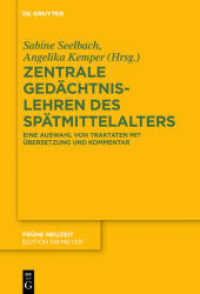- ホーム
- > 洋書
- > ドイツ書
- > Humanities, Arts & Music
- > Linguistics
- > general surveys & lexicons
Full Description
The purpose of this volume is to investigate the languages of dubbing. The plural evokes the complex interplay of different codes as well as the numerous levels of analysis involved. The volume focuses on the languages of Anglophone films and television series and their dubbing into Italian while broadening the perspective to the general debate on audiovisual translation. Dubbing offers itself as a privileged place where languages interact in simulating, creating and recreating fictive orality and where influential linguistic and pragmatic conventions are generated and developed. The chapters cover a rich range of topics including syntactic, lexical and sociolinguistic features of audiovisual dialogue, cross-linguistic contrasts, and the translation of culture specific references and multilingualism on screen. The volume provides an updated picture of research on Italian dubbed language, a key area of inquiry with reference to the investigation of telecinematic discourse, Audiovisual Translation and Corpus-based Translation Studies.
Contents
Contents: Maria Pavesi/Maicol Formentelli/Elisa Ghia: The languages of dubbing and thereabouts: an introduction - Maria Pavesi: The Pavia Corpus of Film Dialogue: a means to several ends - Elisa Ghia: «That is the question»: direct interrogatives in English film dialogue and dubbed Italian - Veronica Bonsignori/Silvia Bruti: How people greet each other in TV series and dubbing - Serenella Zanotti: «It feels like bits of me are crumbling or something»: general extenders in original and dubbed television dialogue - Maicol Formentelli: Exploring lexical variety and simplification in original and dubbed film dialogue - Maicol Formentelli/Silvia Monti: Translating slanguage in British and American films: a corpus-based analysis - Joseph Brincat: Morphological and semantic simplification in dubbing. Translating the dialogue of British films: From Ae Fond Kiss to The Queen - Irene Ranzato: Period television drama: culture specific and time specific references in translation for dubbing - Giuseppe De Bonis: Dubbing multilingual films between neutralisation and preservation of lingua-cultural identities: a critical review of the current strategies in Italian dubbing.








